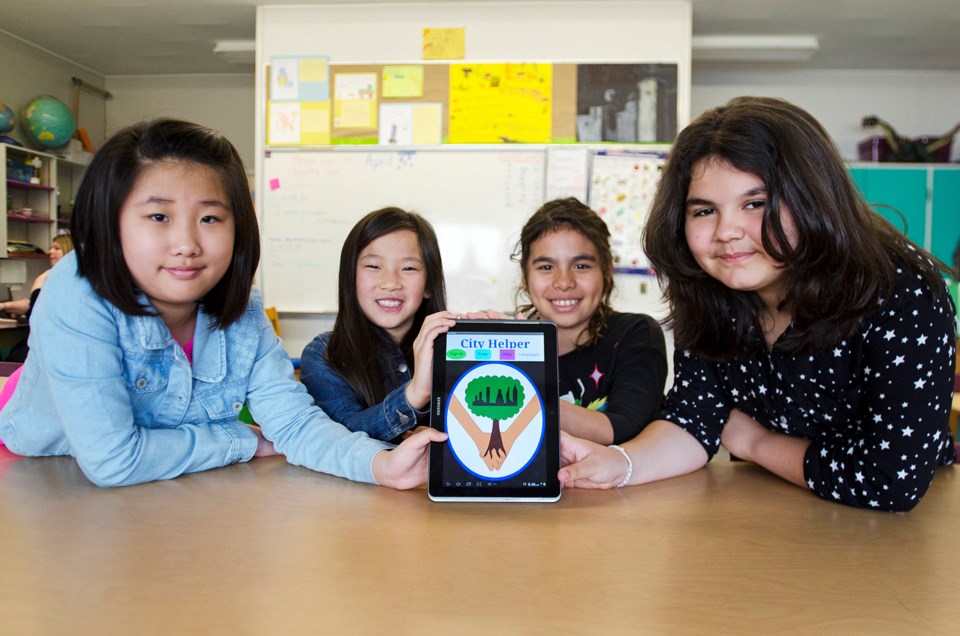When Cameron Elementary teacher Micheline Kamber put out a call for girls who wanted to try their hand at developing an app for the Technovation tech competition, she didn’t expect a team of nine-year-olds to sign up.
She knew they’d be up against girls as old as 14, in a contest that challenges participants to identify a problem, create a mobile app to solve it, code the app, make a business plan and pitch the whole thing to expert judges – all in three months.
“We didn’t expect the little ones to show up,” Kamber said, “but I couldn’t say no.”
Good thing.
Last month, Tec Girls – a team made up of Grade 4 students Barbara Castano, Mitra Abtahi, Jasmine Shim and Liyah Li – won the middle school category of a regional pitch competition at SFU with their app, City Helper.
The app is a game designed to help new students get to know their community.
Using Google Maps, it encourages new students – transfers, international students, new immigrants and refugees – to explore and learn about things in their new neighbourhood, like parks, pools, community centres, libraries and doctors’ offices.
Visiting new places earns players points, with extra points being awarded for visiting the places in person – something the app tracks by GPS.
“I’ve been new to two schools,” Abtahi told the NOW. “I feel really bad for the new students, so I’m just like, ‘Hey, I know how it feels to be new to lots of schools because I’ve been new to two, so why don’t we just make an app that can help them know their community.’”
This year’s Technovation challenge was to solve a problem in the community using mobile technology.
With 61 students (or 16 per cent of the student population) at Cameron new to the school this year, Tec Girls tackled the challenge of helping new kids explore their new community.
Technovation is a global competition designed to narrow the gender gap in technology.
The size of that gap is still a lot bigger than Cameron learning support teacher Micheline Kamber would have expected in this day and age.
Originally a computer scientist, she was one of only three women in her class when she was doing her training back in the 1980s.
But she said friends who teach at the post-secondary level tell her those numbers haven’t changed much.
“I’m shocked that it’s not changed since then, that it’s still very imbalanced, so now that’s why I’m really excited about getting girls excited about careers in computer science.”
Cameron mom Erika Castellanos, who co-coached the school’s Technovation teams with Kamber is also troubled by the low number of women in high-tech education and jobs in Canada.
An industrial engineer originally from Colombia, she said things are more equal in her home country.
Getting boys and girls to code together when they’re young – like for the Hour of Code program the school has participated in for three years – is one way she thinks Canadian schools could improve the situation.
“When you have boys and girls playing together, learning how to code for both of them, it’s going to be natural, normal,” she said. “It’s going to be part of their life.”
SFU computer engineering professor Lesley Shannon, who judged SFU’s regional Technovation event, sees signs of hope in the Tec Girls and the other young competitors.
“I was inspired to see, particularly the middle school girls, how far they got,” she told the NOW. “I was really impressed by the level of detail they had with their app and even in their presentation. … I don’t remember what I was doing when I was nine, but I’m pretty sure it wasn’t doing a market analysis.”



